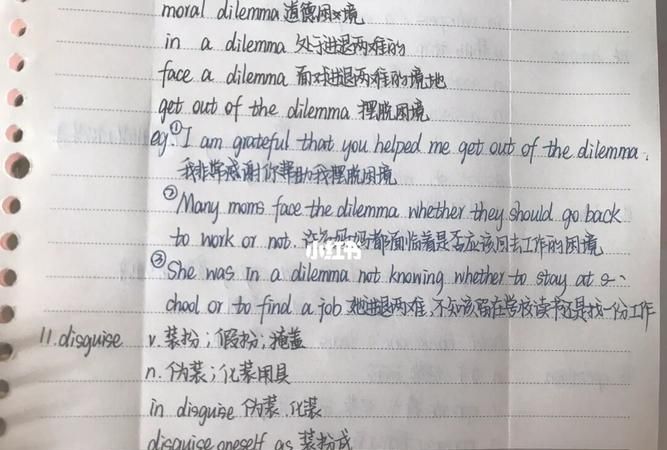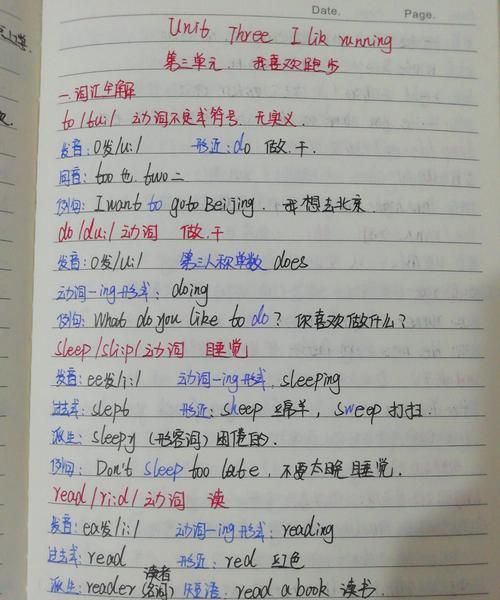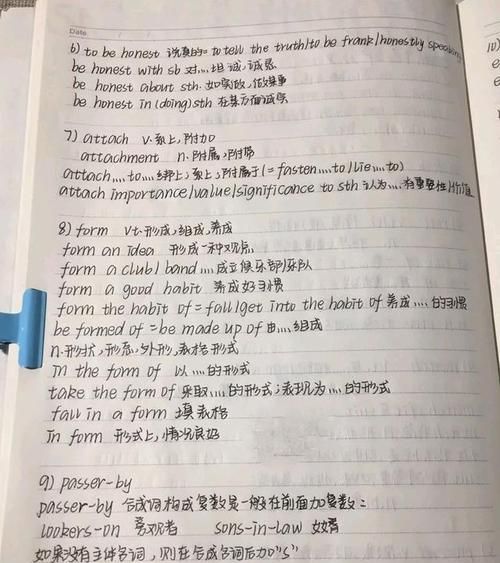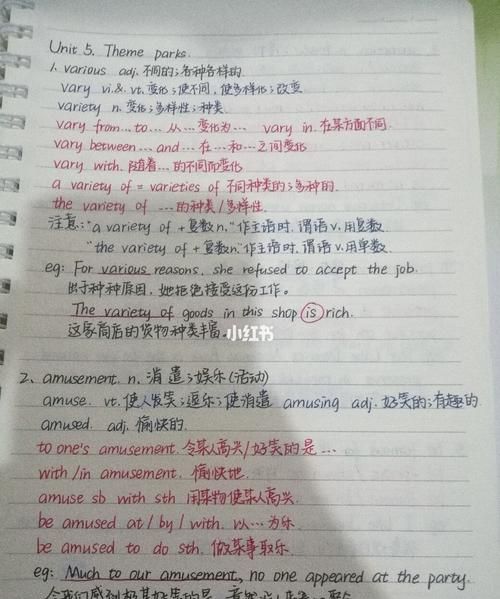本文目录
高一英语必修二语法知识点总结
一. 一般现在时
1. 表示主语现在所处的状态及其所具备的特征、性格、能力等
例如:I am a girl.
2. 表示习惯性、经常性的动作
例如:I usually go to bed at 9:00.
3. 标志性的词语
Always often sometimes now and then
4. 若助于为第三人称单数(he she it)则动词要用单三现
二. 现在进行时
1. 说话时正在进行的动作
例如:I am reading.
2.表示即将发生的动作,多用于go come start leave return arrive stay fly等词语之中,句子中常常有时间状语
例如:The plane is going to Beijing.
3.当句子中出现了always 、forever 、constantly 、continually 、
All the time等
例如:I am always thinking of you.
三. 倍数比较
1.A+系动词+倍数词+as+ adj \adv的原型+as+B
例如:The class is twice as big as that one.
2.A+系动词+倍数词+adj\adv的比较级+than+B
例如:The class is twice bigger than that class.
3.A+系动词+倍数词+the size\amount(数量)\ength\width\height
\depth\+of+B
例如:The class is twice the size of that class.
四. With的复合结构
1. With+宾语+宾语补足语
宾语补足语根据逻辑意义的不同可以是不同的词语,如形容词、现在分词、过去分词、副词、介词短语、不定式等,with在复合结构中常作状语
2.常用结构
○1with+宾语+doing
表主动与进行
例如:Tom was quite safe with Lucy standing behind him.
○2with+宾语+done
表被动与完成
例如:With all things she need bought,she went home.
○3with+宾语+to do
表将来
例如:With so many thing to deal with.
五. 现在完成进行时
现在完成进行时
1.基本表达式(I have been doing )
I/ we/ you/ they have been doing sth.
he/ she/ it has been doing sth.
2.表示从过去某时开始一直持续到现在的动作,并且还将持续下去.
The Chinese have been making paper for two thousand years.
中国有2000年的造纸历史.(动作还将继续下去)
I have been learning English since three years ago.
自从三年前以来我一直在学英语.(动作还将继续下去)
3.表示在说话时刻之前到现在正在进行的动作.
We have been waiting for you for half an hour.
我们已经等你半个钟头了(人还没到,如同在电话里说的,还会继续等)
4.有些现在完成进行时的句子等同的句子.
例如:They have been living in this city for ten years.
They have lived in this city for ten years.
他们在这个城市已经住了10年了.
I have been working here for five years.
I have worked here for five years.
我在这里已经工作五年了.
5.大多数现在完成进行时的句子不等同于现在完成时的句子.
例如:I have been writing a book.(动作还将继续下去)
我一直在写一本书.
I have written a book.(动作已经完成)
我已经写了一本书.
They have been building a bridge.
他们一直在造一座桥.
They have built a bridge.
他们造了一座桥.
6.表示状态的动词不能用于现在完成进行时.
例如:I have known him for years.
我认识他已经好几年了.
I have been knowing...
这类不能用于现在完成进行时的动词还有:love爱,like喜欢, hate讨厌,等.
注意:比较过去时与现在完成时
1.过去时表示过去某时发生的动作或单纯叙述过去的事情,强调动作;现在完成时为过去发生的,强调过去的事情对现在的影响,强调的是影响.
2.过去时常与具体的时间状语连用,而现在完成时通常与模糊的时间状语连用,或无时间状语.
一般过去时的时间状语:
yesterday, last week,…ago, in1980, in October, just now, 具体的时间状语
共同的时间状语:
this morning, tonight,this April, now, once,before, already, recently,lately
现在完成时的时间状语
for, since, so far, ever, never, just, yet, till / until, up to now, in past years, always,
不确定的时间状语
3.现在完成时可表示持续到现在的动作或状态,动词一般是延续性的,如live, teach, learn, work, study, know.
过去时常用的非持续性动词有come, go, leave, start, die, finish, become, get married等.
例如: I saw this film yesterday.
(强调看的动作发生过了.)
I have seen this film.
(强调对现在的影响,电影的内容已经知道了.)
Why did you get up so early?
(强调起床的动作已发生过了.)
Who hasn't handed in his paper?
(强调有卷子,可能为不公平竞争.)
She has returned from Paris.
她已从巴黎回来了.
She returned yesterday.
她是昨天回来了.
He has been in the League for three years.
(在团内的状态可延续)
He has been a League member for three years.
(是团员的状态可持续)
He joined the League three years ago.
( 三年前入团,joined为短暂行为.)
I have finished my homework now.
---Will somebody go and get Dr. White?
---He's already been sent for.
句子中如有过去时的时间副词(如 yesterday, last, week, in 1960)时,不能使用现在完成时,要用过去时.
(错)Tom has written a letter to his parents last night. (对)Tom wrote a letter to his parents last night.
六.过去完成时
1. 概念:表示过去的过去
其构成是had +过去分词构成.
那时以前 那时 现在
2. 用法
a. 在told, said, knew, heard, thought等动词后的宾语从句.
She said (that) she had never been to Paris.
b. 状语从句
在过去不同时间发生的两个动作中,发生在先,用过去完成时;发生在后,用一般过去时.
When the police arrived, the thieves had run away.
c. 表示意向的动词,如hope, wish, expect, think, intend, mean, suppose等,用过去完成时表示"原本…,未能…"
We had hoped that you would come, but you didn't.
3.过去完成时的时间状语before, by, until , when, after, once, as soon as.
例如:He said that he had learned some English before.
By the time he was twelve, Edison had began to make a living by himself.
Tom was disappointed that most of the guests had left when he arrived at the party.
七.现在完成进行时
1.其构成形式如下:
I / we / they have been + 动词的现在分词
He / she / it has been + 动词的现在分词 功用如下:
2. 表示一个在过去开始而在最近刚刚结束的行动,如:
Ann is very tired. She has been working hard.
Why are you clothes so dirty? What have you been doing?
3.表示一个从过去开始但仍在进行的行动,如:
It has been raining for two hours. (现在还在下)
Jack hasn’t been feeling very well recently.
4. 表示一个从过去开始延续到现在,可以包括现在在内的一个阶段内,重复发生的行动,如:
She has been playing tennis since she was eight.
5. 现在完成时强调动作行为的结果、影响,而现在完成进行时只强调动作行为本身,如:
Tom’s hands are very dirty. He has been repairing the car.
The car is going again now. Tom has repaired it.
注意:
现在完成时有否定结构、而现在完成进行时没有否定结构. 现在完成时态可表示做完的时期以及已有的经验、但现在完成进行时不可以 现在完成进行时的否定结构 现在完成进行时有时也可用否定结构.
如: Since that unfortunate accident last week, I haven’t been sleeping at all well. 自从上周发生了那次不幸事故之后,我一直睡得很不好.
He hasn’t been working for me and I haven’t has that much contact with him. 他并没有给我工作过,我和他没有过那许多接触.
6.否定句构成:
主语+has/have+not+been+现在分词
7.一般疑问句构成:
Have/has+主语+been+现在分词+其他

高一英语必修一笔记和知识点总结
高一英语学习主要以基础向中上层发展,下面是广东高一英语必修二知识点总结,欢迎参考阅读!
Unit1 Cultural relics
1. in search of 寻找,寻求
2. survive vi. 幸存,生还 n. 幸存者 survivor
3. be decorated with被用······来装饰
decorate sth with sth 用某物装饰某物
4. belong to属于,是…的成员, 是…的组成部分,属性, 职能等
5. serve as担任,充当
6. in return 作为回报, 作为回馈
in return of作为…的回报
7. 定语从句修饰 the way的关系代词可用8. light 照亮,点亮 light-lit-lit 或 light-lighted-lighted
9. there is no doubt that… 毫无疑问……
10. be worth sth. 值得…
be (well) worth doing sth.很值得做…
11. be at war 处于战争状态,交战
12. remain vi. 留下,剩下,残留+doing link-v. 保持,仍然,继续+adj.
Unit 2 The Olympic Games
1. ancient: 古代的---反义词 present-day 当今的
2. compete with/ against sb. 和…竞争
compete in 在……中竞争
compete for sth. 为……而竞争
competition n. 比赛
3. take part (in) 参加,参与(活动)=join in
take an active part in…积极参与……
4. used to do 过去常常做...
be/get used to (doing) sth. 习惯于
be used to do 被用来做
5. every four years = every fourth year 每四年或每隔四年
6. admit+ doing承认做某事
be admitted as “被接受……成为”
7. for the honor of为了…的荣誉
in the honor of为庆祝…/为纪念
8. allow sb. to do sth.允许某人做某事
allow doing sth. 允许做某事
9. not only… but also… 不但……而且
10. “也”as well用在肯定句中,放在
too,放在,常用逗号隔开
either ,常用逗号隔开
also放在特殊动词之后,实义动词之前
Unit 3 Computers
1. common adj. 普通的,常见的 n. 普通;平民
have nothing/ little/ something/ a lot in common 有……共同之处
2. compare …with 把……与……相比较
compare to 把……比作……
3. “ 多久才” It took/was+一段时间+before
It takes /will be+一段时间+before
It takes/took sb. sometime to do sth. 花费某人……时间去做某事
4. work as担任;以…身份而工作
5. from then on 从那时起
from now on 从现在起
6. by 介词,“不迟于,到……为止” 常用于完成时态。
since+时间点“自从…以来”
7. as time goes by 随着时间流逝
8. as a result 结果
9. so… that如此…以致
10. so+ adj. +a(n)+单数可数名词+that句子
such+ a(n)+ adj.+单数可数名词+that句子
11. alone adj.“单独的” adv. 单独;独自地 (客观)
lonelyadj.“孤独的”、“偏僻的” (主观)
12. as well as “还有”、“不但…而且…”
as well “也”
13. be filled with = be full of充满;装满
14. in a way 在某种程度上
15. make up 编造,补足,化妆
16. after all毕竟
17. with the help of 在…的帮助下
Unit 4 Wildlife Protection
1. die out 灭亡;逐渐消失
2. in peace 和平地;安详地;和睦地
3. in danger(of) 在危险中,垂危
4. in relief 如释重负
5. burst into laughter 突然笑起来
6. protect...from 保护……不受……(危害)
7. pay attention to 注意
8. come into being 形成;产生
9. without mercy 毫不留情地
10. respond to 对……作出回答
Unit 5 Music
1. dream of/about (doing) sth. 梦想;幻想
2. pretend to do / be 假装做某事
3. to be honest 说实话
be honest with sb. 对某人坦白
be honest in sth.坦白承认
4. attache… to认为有(重要性、意义);附上;连接
5. form the habit of 养成……的习惯
6. perform侧重表演的能力、技巧或效果;主语可以是人或动物
act 侧重“扮演、担任”某一角色,侧重于动作,主语通常是人。
performance n.演出;演奏;表演
7. in cash 用现金,用现钱
pay in cash 给现金;现金支付
by credit card 用信用卡
by cheque / check 用支票
8. play a joke on sb.=play jokes on sb. 戏弄
make fun of 捉弄;取笑
laugh at sb. 嘲笑
9. rely on =depend on依靠,指望
10. or so “大约;……左右”
11. break up打碎;分裂;解体;驱散;结束;(学校)放假
break down出故障;拆毁;失败;精神崩溃;(身体)垮
break into破门而入
break off 中断;断交;突然停止
break out 爆发;突然发生
break away from脱离;摆脱
12. above all: 最重要的是,尤其,首先
in all: 一共;总计
after all: 毕竟;终究;别忘了
at all: (否定句)根本,完全 (疑问句)到底
Unit1 Friendship
1. be good to对….友好
2. add up 合计
3. get sth done 使…被做
4. calm down 镇定下来
5. have got to 不得不
6. walk the dog 遛狗
7. make a list of列出
8. hide away 躲藏;隐藏
9. be concerned about 关心;挂念
10. share sth with sb 和某人分享某物
11. go through 经历;仔细检查
12.set down 放下;记下
13. a series of 一系列;一套
14. be crazy about 对…着迷
15. on purpose 故意
16. in order to/ so as to 为了
17. face to face 面对面地
18. get along with 与…相处
19. pack up 收拾,打理行装
20. according to 按照;根据…所说
21. communicate with sb 和…交际
22. try out 试验;试用
23. join in 参加(活动)
24. fall in love 相爱
25. have the/a habit of doing sth 有做…的.习惯
Unit 2 English around the world
1. such as 例如
2. believe it or not 信不信由你
3. come up with 提出 come up (vi) 走进;上来;发生;被讨论
come up to a place 参观某地
4. ever before 从前
5. even if/ though 即使
6. at the end of 在…末期
7. be based on 在...基础上
8. close to 距离…近
9. take…with…随身携带
10. the same…as 与…相同的
11. at present 目前
12. at sb’s request 应某人的要求make a request 请求 request that …(should)+v原形
13.have a command of掌握give commands 命令
14.in one direction 朝一个方向
15. be different from 与…不同
16. as we know 正如我们所知
17. play a role/ part (in) 在…中担任角色;在…中起作用;
play an important role/ part 在…中起重要作用
18. because of 因为;由于
19. make (good/ full) use of (好好/充分)利用
Unit3 Travel Journal
1. one-way fare 单程票 round-trip fare 往返票
2. graduate from 从…毕业
3. care about 忧虑,关心care for喜欢,照顾 care to do愿意/同意做某事
4. give in (to) 投降;屈服;让步 give up 放弃
give up doing/sth as usual 像往常一样
5. at midnight 午夜
6. attitude to/ toward(s) 对…态度
7. change one’s mind 改变主意
8. make camp 野营,宿营
9. make up one’s mind to do 决心干某事
10. put up one’s tents 搭起帐篷
11. persuade sb to do sth= persuade sb into doing sth 说服某人做某事
persuade sb not to do sth= persuade sb out of doing sth 说服某人不做某事
12. determine to do sth ( 动作) / be determined to do sth (心理) 决心干某事
13. take one’s breath away 使某人大吃一惊
Unit4 Earthquakes
1.have time to do 有时间做某事
2.happen to do 碰巧做某事
3.shake hands with sb 握手
4. burst into tears/ laughter 突然大哭/大笑
5.in ruins 成为废墟
6.blow away 吹走、刮走
7.fall down 倒塌
8.be pleased to do 乐意做某事
9.tens of thousands of 成千上万
10. dig out 挖掘
11.think little of 对……评价低
12.be proud of / take pride in 以……而自豪
13.invite sb to do sth 邀请某人做某事
14.think highly of 对……评价高
15.give out 发出(气味等);分发;耗尽 give off 发出(气味等)
give away 赠送;泄露 give back 归还
16.a great/ large number of =a great many/good 大量的
17.be trapped in/ under 陷入……/ 陷在……下面
18.agree on sth 达成一致意见
19.as you know 正如你所知道的
20.be known as 作为……而知名 be known for 因……而出名
Unit5 Nelson Mandela
1.lose heart 丧失勇气
2..be worried about 担心(状态)
3.in trouble 处于不幸中
4.be sentenced to 被判处
5. be out of work = lose one’s job 失业
6.be equal to 相等的,平等的
7. as a matter of fact = in fact = actually 事实上
8.blow up 充气 爆炸
9.beg for 乞讨
10.set up 建立,创立;设置,竖起 send up 发射,使上涨
go up 上升,增长;被兴建
11.be active in = take an active part in 积极参与,在……活跃
12.die for 为……而死 die from 死于(外因)
die of 死于(内因 如:饥饿,寒冷,疾病等)
13.put sb in prison= throw sb into prison= send sb to prison 把……投入监狱
14.advise sb to do sth 建议某人做某事
15.fight against 为反对……而斗争
fight with 同……并肩作战/ 同……斗争
16. have problems/ difficulty/ trouble with sth
17.work out 算出
18.be willing to do sth 乐于做某事
19.realize one’s dream of 实现…… 的梦想
20.come to power 当权,上台

高中英语必修二知识点总结大全
关于任何事物的知识都有五个层次或者要素:事物的名称、定义、形象,有关事物的智识或者知识,以及事物本身——这才是知识的真正目标。下面我给大家分享一些高中英语必修二知识点,希望能够帮助大家,欢迎阅读!
高中英语必修二知识点1
Unit1 Cultural Relics
【重点单词、 短语 】
1. survive 幸免,生存,生还
2. in search of 寻找
3. select 挑选
4. design 设计,图案,构思
5. fancy 奇特的,异样的,想象
6. decorate 装饰,装潢
7. belong to 属于
8. in return 作为回报
9. at war 处于交战中
10. remove 移动,搬动
11. less than 少于
12. doubt 怀疑
13. worth 值得的,相当于…的价值
14. take apart 拆开
15. explode 爆炸
16. sink 下沉,沉下
17. think highly of 高度评价
【重点句型】
1. There is no doubt that… 毫无疑问…
2. when的用法
was/were doing…when… 正在做某事…这时
was/were about to do… when…. 将要做某事…这时
had just done…when… 刚做完某事…这时
3. China is larger than any other country in the world. (同一范围内的比较)
She runs faster than any man in Greece. (不同范围内的比较)
4. the way的用法
The way___ he explained to us was quite simple. (that/which/省略)
The way ___ he explained the sentence to us was not difficult. (that/in which/省略)
5. worth的用法
be (well) worth doing sth (很)值得做某事
be worthy to be dOne= be worthy of being done
It’s worthwhile to do sth = it’s worthwhile doing sth
6. “疑问词+ to do” 结构,在句中做主语、宾语、表语
How to do it is a question.
I don’t know what to do next.
7. it做形式主语
It has been proved that pride goes before a fall.
事实证明骄必败。
8. what 引导主语从句,在从句中作主语
What he has said is of great importance.
What happened to him remained unknown.
?名校课堂每天必读
书山有路勤为径,学海无涯苦作舟!
Diligence is the path to the mountain of knowledge,hard-working is the boat to the endless sea of learning.
【语法 总结 】
非限定性定语从句
非限定性定语从句的作用是对所修饰的成分作进一步说明(注:通常和主句间用逗号隔开,不受主句 句子 结构的影响,将从句拿掉后其他部分仍可成立)
限制性定语从句与非限制性定语从句的六点区别
区别一:形式不同
限定性定语从句主句和从句之间不用逗号隔开,口语中使用时也不停顿;而非限定性定语从句与主句之间通常有逗号隔开,口语中使用时有停顿。
区别二:功能不同
限定性定语从句用于对先行词的意义进行修饰、限制和识别,如果去掉,就会造成句意不完整或概念不清;而非限定性定语从句用于对先行词起补充说明作用,如果省略,句意仍然清楚、完整。如:
People who take physical exercise live longer. 进行体育锻炼的人活得长些。(若把从句去掉句子就失去意义)
His daughter, who is in Boston now, is coming home next week. 他女儿现在在波士顿,下星期回来。(若把从句去句子意义仍然完整)
区别三:翻译不同
在翻译定语从句时,一般把限定性定语从句翻译在它所修饰的先行词之前,而把非限定性定语从句与主句分开。如:
He is the man whose car was stolen. 他就是汽车被窃的那个人。
I’ve invited Jim, who lives in the next flat. 我邀请了吉姆,他就住在隔壁。
区别四:含义不同
比较下面的两个句子:
I have a sister who is a doctor. 我有一个医生的姐姐。(姐姐不止一个)
I have a sister, who is a doctor. 我有一个姐姐,她是当医生的。(只有一个姐姐)
区别五:先行词不同
限定性定语从句的先行词只能是名词或代词,而非限定性定语从句的先行词则可以是名词或代词,也可以是短语或句子;另外,当先行词为专有名词或其他具有独一无二性的普通名词时,通常要用非限制性定语从句,而不用限制性定语从句。如:
Peter drove too fast, which was dangerous. 彼得开车很快,这是很危险的。(which指drive too fast)
He changed his mind, which made me very angry. 他改变了主意,这使我很生气。(which指整个主句)
区别六:关系词不同
关系词that和why可用于限制性定语从句中,通常不用于非限制性定语从句;另外,在限制性定语从句中,关系词有时可以省略(参见本章有关内容),而在非限制性定语从句中关系词一律不省略。
高中英语必修二知识点2
Unit2 The Olympic Games
【重点单词、短语】
1. compete 比赛,竞争
2. take part in 参加,参与
3. stand for 代表,象征,表示
4. admit 容许,接纳,承认
5. as well 也,又,还
6. host 做东,招待,主人
7. replace 代替
8. charge 收费,控诉
in charge 主管,看管
9. advertise I做 广告 ,登广告
10. bargain 讨价还价,讲条件,便宜货
11. one after another 一个接一个地
12. deserve 应受(报答或惩罚)
13. deserve的用法
deserve to do sth 应该做/值得做
deserve doing = deserve to be done 值得… (doing 表被动意义)
Your suggestion deserves to be cOnsidered= deserves considering.
( 用法相似的动词:need/want/require doing= need/want/require to be done 需要….)
14. take part in : 参加有组织的、重大的活动
join in 参加正在进行的活动
join: 参加团体,党派和组织,成为其中的一员(join the army; join the party)
attend: 出席,参加,后跟 meeting,wedding,class, course等
【重点句型】
1. nor/neither + 助动词/be/情态动词 + 主语:表示“…也不这样”
I have never been abroad, and neither/nor has he.
If you don’t go to the party, nor will I.
2. So+情态动词/助动词/be动词+主语 :表示“...也是的一样的”, 强调后者同前者肯定情况一样。
3. So+主语+情态动词/助动词/be动词:表示 “的确如此”,对前面情况的肯定。
4. not only…but (also)… 不但...而且...
Women are not only allowed, but play a very important role in gymnastics.
(1) 引导并列结构:引导主语时,谓语动词 就近原则。
(2) 引导并列句时,not only句倒装,即前倒后不倒。
Not only did they take photos, but also they had a bid dinner.
【语法总结】
被动语态
一. 概念:主动语态表示主语是动作的执行者,被动语态表示主语是动作的承受者。
二. 各种时态被动语态的形式
1. 一般现在时的被动语态 am/is/are + done
2. 一般过去时的被动语态 was/were + done
3. 一般将来时的被动语态 ⑴will be done is/am/are going to be done
4. 现在进行时的被动语态 is/am/are + being + done
表示说话人说话时或现阶段正在进行的动作,经常和时间副词now (现在), right now (现在, 此刻), at present (现在,目前), at this moment (此刻)连用。
5.现在完成时的被动 have/has been done
现在完成时常与already, always, often, ever, never, yet, not...yet, just等不表示明确的时间副词连用, 还可以和表示时间一直延续到目前的带(ever )since, for的状语及包括现在在内的词连用。如: now, today, this month, this year, recently, these days,many times, so far, by now, in the past/last few days/years… 等。6. 过去完成时的被动 had been done
7. 过去将来时的被动 would be done
8. 过去进行时的被动 was/were being done
9. 带情态动词的被动语态 情态动词 + be done
10. 动词不定式的被动式 to be done
e.g. It is an honor for me to be asked to speak here.
三. 注意事项
1. 并不是所有动词都有被动语态
happen, take place, break out, belong to, cost, last等不及物动词或词组无被动语态。
2. 短语动词、固定搭配变被动语态介词或副词不能省。
E.g. Time should be made full use of.
3. 双宾语:一个宾语成主语,另一主语保留不变。
E.g. Mother will buy me an iphone5. → I will be bought an iphone5 (by my mother) .
→ An iphone5 will be bought for me (by my mother) .
高中英语必修二知识点3
Unit3 Computers
【重点单词、短语】
1. solve 解决;解答
2. from…on 从…...时起
3. as a result 结果
4. so…that 如此…以至于
5. explore 探索,探测,研究
6. anyhow 无论如何,即使如此
7. goal 目标,球门,得分
8. human race 人类
9. signal 发信号,信号
10. type 类型,打字
11. in a way 在某种程度上
12. arise 出现,发生
13. with the help of 在…...的帮助下
14. electronic 电子的
15. deal with 处理
16. watch over 看守,监视
17. rise/arise/arouse/raise的区别
【重点句型】
1. certain和sure的句型
sb. be sure/certain of…= sb. be sure/certain that从句:某人确信…
be sure/certain to do sth. 肯定会做…
It’s certain that从句 肯定会
例如:It’s certain that he will succeed.=He’s sure/certain to succeed.他肯定会成功的。
I’m sure/certain of his success.= I’m sure/certain that he will succeed. 我确信他会成功的。
2. 主语+ be + adj + to do The question is easy to answer.
3. 状语从句的省略
在when, while, if, unless, though, once等引导的状语从句中,如果从句的主语和主句的主语一致, 且从句中的谓语含有be动词时, 为了使句子简洁, 可省略从句中的主语和be动词。
While playing in the snow, the two pandas had great fun.
Unless invited, he has decided not to attend that activity.
【语法总结】现在完成时的被动语态(详见第二单元)
高中英语必修二知识点4
Unit4 Wildlife protection
【重点单词、短语】
1. die out 灭亡、逐渐消失
2. hunt 打猎,猎取
3. in peace 和平地,安详地
4. in danger of 在危险中
5. in relief 如释重负,松了口气
6. burst into laughter 突然笑起来
7. protect…from 保护…不受…之害
8. contain 包含,容纳,容忍
9. affect影响,感动,侵袭
10. pay attention to 注意
11. appreciate 鉴赏,感激
12. succeed 成功,接替
13. employ 雇佣,利用
14. harm 危害
15. bite 咬,叮
16. come into being 形成,产生
17. inspect 检查,视察
18. according to 按照,根据
19. so that 以至于
【重点句型】
1. succeed in doing sth 成功的做某事
succeed to sth 继承某事
2. under construction/discussion 正在被建设/讨论
in use 正在被使用
3. do harm to sth = be harmful to sth 对…有害
there is no harm in doing sth 做某事无害
4. be used to do sth 被用来做…
used to sth 过去常常做...
be used to doing sth 习惯于做某事
5. It won’t be long before… 过不了多久…就会…
6. take measures to do sth 采取 措施 做某事
7. with的复合结构:with + n/pron + adj/adv/ 介词短语/现在分词/过去分词/不定式
With a lot of problems to settle, she can’t go out. (将来)
With time going by, he is getting along well with his English. (主动,进行)
With the work done, he can go out. (被动,完成)
【语法总结】现在进行时的被动语态(详见第二单元)
高中英语必修二知识点5
Unit5 Music
【重点单词、短语】
1. roll 滚动,摇晃,卷,
2. dream of 梦见,梦想
3. to be honest 实话说
4. attach 系上,附加
attach …to 认为有……(重要性、意义)
5. form 组成,形成,构成
6. earn 赚,挣得
7. perform 表演,执行,履行
8. in cash 用现金,有现钱
9. play jokes on 戏弄
10. rely on 依赖,依靠
11. be/get familiar with 熟悉
12. or so 大约
13. break up 打碎,分裂
14. in addition 另外
15. sort out 分类
16. above all 最重要,首先
【重点句型】
1. dream of/about 梦想做…
2. to be hOnest= honestly speaking = to tell the truth 说实话
3. form the habit of... 形成…习惯
in the form of… 以…形式
4. I would appreciate it if… 如果…我将不胜感激.
go wrong 出故障 come up with 提出 make up 构成;编造 a5. as is often the case 情况通常如此
6. It looks as if it is going to rain.(真实语气:很有可能发生)
He treats me as if I were a stranger. (虚拟语气:与现在事实He talked about Rome as if he had been there before. (虚拟语气:与过去事实相反)
【语法总结】
“介词+which/whom”引导的定语从句
关系代词在定语从句中作介词后面的宾语时,有时可把介词提到关系代词的前面,但这时如果先行词是人,要用“介词+whom”引导定语从句;如果先行词是物,要用“介词+which”引导定语从句。且关系代词都不能省略。
Eg: 1. The girl whom I borrowed the bike from is my friend.
2. The girl from whom I borrowed the bike is my friend.
3. How is the film about which I often talked to you?
4. Is this the room in which Mr. Smith lives?
注意:一些固定的含有介词的短语动词在定语从句中不能拆开,即不能把介词放关系词前。
1. This is the bag which he is looking for .
2. The old lady whom she is looking after is her teacher.
高中英语必修二知识点总结相关 文章 :
★ 高一英语必修二知识点总结
★ 高一英语必修二知识点梳理
★ 高中英语必修二知识点
★ 高中英语知识归纳笔记
★ 高二英语必修二Unit5必背知识
★ 高中英语必修二第一单元知识习题及答案
★ 高一必修二的英语单词表
★ 高中必修二英语知识点
★ 高一英语必修二unit2知识点
★ 高一英语必修二unit1知识点

高一英语必修二第四单元课文翻译
不知道你是否是指reading的。。
我是谁?
经过一段时间我已经被改变了很多。1642年我在法国诞生时是一台计算机器。尽管当时我还小,但是我能简化一些复杂的数学题。我发育缓慢,差不多到了两百年之后,查尔斯.巴比奇才把我制成了一台分析机。在操作员用穿孔卡为我设计程序后,我能够比任何人更快地算出答案。那时这被当作一次技术革命,也是我“人工智能”的开始。在1936年,我真正的父亲艾伦.图灵写了一本书,讲述了怎样使我成为一台“通用机器”来解决任何数学难题。从那时起,我在体积和脑容量方面迅速成长。到了二十世纪四十年代,我已经长得像一间屋子那么大,我不知道是否还会长得更大。但是,这个现实也使得我的设计者很担心。随着时间的推移,我被弄得越来越小。自二十世纪七十年代以来,我一直被用在班公室和家庭里,先是用作个人电脑,后来又做成便携式。
这些变化只有随着我的存储能力的不断提高才成为可能。最初是被存储到电子管中,以后是晶体管上,后来是非常小的芯片上。结果,我已经完全改变了我的形状,随着我年龄越来越大,我也变得越来越小。在一段时间里,我的记忆能力发展得如此之快,就像一头大象一样,从来不会忘记告诉我的任何事情!我的存储容量变得如此巨大,连我自己都不能相信!但是我总是孤孤单单地站在那里,直到二十世纪六十年代初,人们才给了我一个用网络联成的家庭。我能够通过万维网和其他人分享我的知识。
从二十世纪七十年代起,我又被开发出了很多新用途。我在通讯、金融和商业领域变得非常重要。我还被放在机器人里面,被用于制作移动手机,并且用来帮助做医疗手术。我还被放置在太空火箭里去探测月球和火星。不管怎样,我的目标是给人类提供高质量的生活,现在我充满了幸福感,因为我是人类忠实的朋友并时时给他们提供帮助。
累。。其他不帮你写了,文章很长,分太少了…

以上就是关于必修二英语第三单元笔记 ,高一英语必修二语法知识点总结的全部内容,以及必修二英语第三单元笔记 的相关内容,希望能够帮到您。

